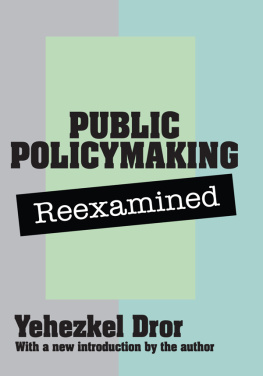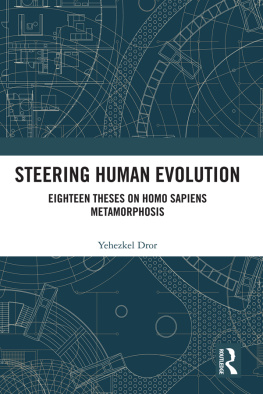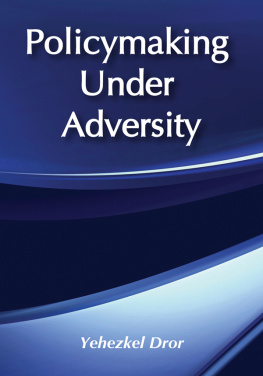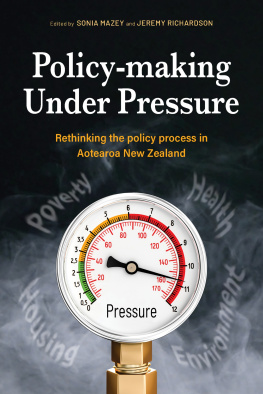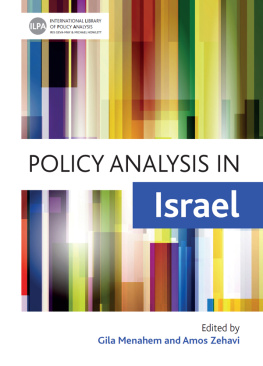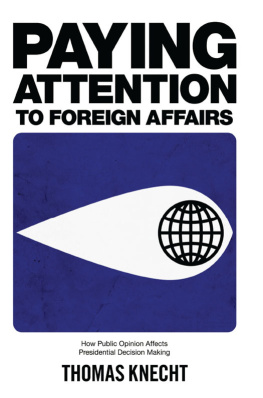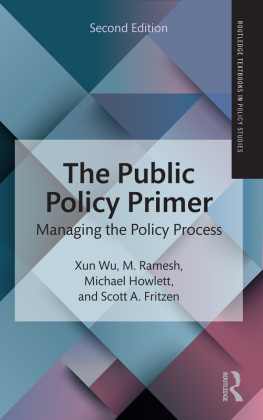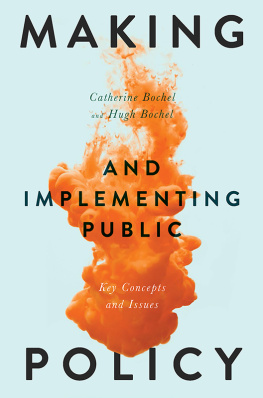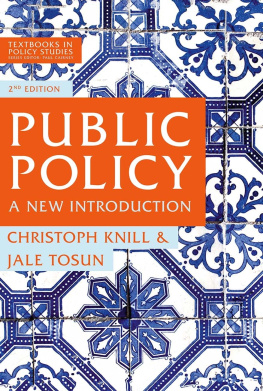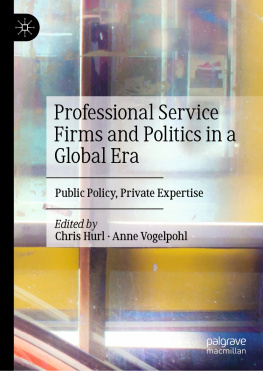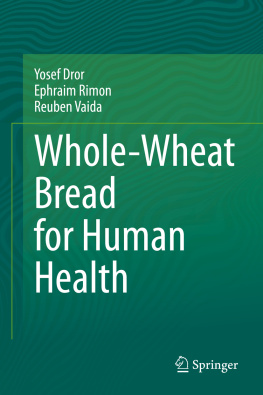First published 1983 by Transaction Publishers
Publishers Published 2017 by Routledge
2 Park Square, Milton Park, Abingdon, Oxon OX14 4RN
711 Third Avenue, New York, NY 10017, USA
Routledge is an imprint of the Taylor & Francis Group, an informa business
New material this edition 1983 by Taylor & Francis
Original edition 1968 by Chandler-Publish-ing Company.
All rights reserved. No part of this book may be reprinted or reproduced or utilised in any form or by any electronic, mechanical, or other means, now known or hereafter invented, including photocopying and recording, or in any information storage or retrieval system, without permission in writing from the publishers.
Notice:
Product or corporate names may be trademarks or registered trademarks, and are used only for identification and explanation without intent to infringe.
Library of Congress Catalog Number: 83-351
Library of Congress Cataloging-in-Publication Data
Dror, Yehezkel, 1928-
Public policymaking reexamined.
Reprint. Originally published: San Francisco: Chandler Pub. Co.,
[1968] (Chandler publications in political science).With new introd.
Bibliography: p.
Includes index.
1. Policy sciences. I. Title.
H97.D76 198335083-351
ISBN 0-87855-928-0 (pbk.)
ISBN 13: 978-0-87855-928-2 (pbk)
Introduction to the Transaction Edition
I nterest in the study and improvement of policymaking has been on the increase during the fifteen years since this book was first published. Multiplication of teaching programs, periodicals, and books devoted to policy sciences (never mind under what name) testifies to intense academic activity; and proliferation of improvement attempts in many governments indicates growing practical concerns.
But no breakthroughs have occurred. While somewhat better data is available on some facets of policymaking and a few useful concepts have been developed (Dunn [1981] surveys the field admirably, with comprehensive bibliographies), no major advances in policymaking theory have taken place. While some countries have engaged in interesting improvement experiments, no shift for the better in overall policymaking has occured. Regrettably, neither research in policy sciences nor changes in policymaking have antiquated this book. Dealing with policymaking theoretically, the main propositions, ideas, concepts, models, and proposals developed in the book continue to fit the real world and the continuing state of policy sciences underdevelopment.
This does not mean that I would rewrite the book as it now stands. Some parts of it are superior to what I could do at present, preoccupied as I am with other perspectives and overloaded as I am with additional acquired incapacities. Some details need revision and updating. Much more important, some perspectives, concepts, ideas, and theoretic observations need to be added. This is the task of the present new introductory essay. A different perspective is presented in Policymaking under Adversity (Dror 1983b).
First, let me move into a short autobiographic prelude. Time has, hopefully, provided better understanding of the impact of life history and identity experiences (to change somewhat a term of E.H. Erickson [1975, ch. 1]) on my intellectual and professional-scientific endeavorsa matter of special importance in as ambiguous and existential a subject as policymaking. The overall orientation of Public Policymaking Reexamined had been strongly shaped by my Israeli background; while my present approaches to policymaking have been significantly reshaped by experiences in governments, with some recent additional input provided by study of German approaches.
As a prelude to the substantive contents of this essay, I would like to share some of these insights with the reader. This, not in order to justify ideas, findings, propositions, and proposals; those have to stand on their own, supported with appropriate professional data and analysis. Neither do I fancy self-exposure for its own sake. Some responses to the book sensitized me to important background differences between many readers and myselfdifferences which cause some problems. Recognition of main influences shaping my professional opinions may help better understanding of my writings, though not necessarily agreement with them. Some such self-observations may also serve as raw material for a sociology of policy scienceswhich is urgently needed, in view of the high sensitivities of this interdiscipline to cultural assumptions and to locality-bound mind sets.
Israeli Life Impacts
Israeli background and engagement influence my policy writings in at least two important dimensions (leaving aside my strategic writings [such as Dror 1980]), distinguishing them in some important respects from prevalent U.S. approaches. First, I believe in a broad ideology, namely Zionism. I therefore consider policy improvement largely, but not exclusively, in an instrumental sense, directed at achieving higher effectiveness in approximating whatever changing values a society, via its legitimate policymakers, prefers. This does not mean that value discourse is unimportant and that I have no strong opinions on various issues (Dror 1983b). But I feel no emotional need to constantly justify policymaking improvement in terms of absolute belief systems. Rather, as explained in this essay, the possibility to strive for value-free understanding of policymaking and for value/sensitivity-tested policymaking-improvement prescriptions is accepted. This may be emotionally difficult for those engaged in advocacy and semiprophetic endeavors; dangerous for those facing nihilism; anathematic and even repugnant to those searching for a faith to believe in; and impossible for those mixing up the roles of politicians, pedagogues, social activists, scholars, and policy professionals (for another view, Tribe 1972). While scholars and policy professionals must follow appropriate rules of ethics (Ad Hoc Committee of the Operations Research Society of America 1971; Dror 1971:119; Mitroff 1972; Wagner 1972), this is quite different from negating the desirability and partial feasibility of Max Weber's value-free science approach as an ideal to strive for within delimited worlds of scientific and professional endeavor (Weber 1949; for a different opinion, Miller 1979). In this connection, Weber's personal engagement in politics, his ethics of responsibility (Roth and Schluchter 1979), and his strong political beliefs are worth mentioning (Bruun 1972; Weber 1958; Mitzman 1970; Mommsen 1974).
With due appreciation of the importance of social critique and intellectuals' roles in it, I think that the functions of policy sciences have a different focus from those of the Frankfurt School (Geuss 1981), though personal overlaps and cross-fertilizations are possible and desirable. The very fact of my strong involvement in sociopolitical activities with intensely held ideologies is probably a main autobiographic feature supporting value-free policy sciences when dealing with knowledge on policymaking, as well as value restraint in making recommendations, in the sense of putting aside personal values in favor of those of the legitimate value judge, while helping the latter develop and clarify his preferences. All this, subject to overarching ethics of responsibility. My legal background may also contribute to this position, owing to the clear distinction in legal ethics and in the legal profession between legal opinions, which try to be clinical and detached, and client-serving legal advocacy, both subject to overriding moral-professional codes of behavior (Katz 1972).




